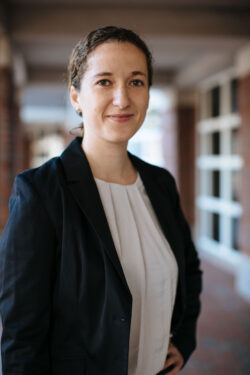
RTAC Researchers in the Struggle to Achieve Social Justice
POSTED February 18, 2022
|Democracy, Human Rights and Governance
In recognition of the United Nations’ February 20 observance of World Day of Social Justice, the Research Technical Assistance Center (RTAC) is recognizing three researchers from its Research Network dedicated to addressing issues such as poverty, exclusion, gender inequality, unemployment, human rights, and social protections. The researchers featured are involved in different aspects in the fight to achieve social justice and understand that a society that embraces the values of social justice helps to ensure peace and security for all.
 Arkeisha Amissah-Arthur is a Virtual Resource Hub Developer at Ashesi University in Berekuso, Ghana. Her areas of expertise include economic development, gender, and social inclusion, program development, and evaluations.
Arkeisha Amissah-Arthur is a Virtual Resource Hub Developer at Ashesi University in Berekuso, Ghana. Her areas of expertise include economic development, gender, and social inclusion, program development, and evaluations.
In the past two years, women have performed fewer activities that support their economic empowerment because of traditional gender roles at home. However, some community-based organizations have used technology to help ensure that gains made are not lost by teaching women how to use technology to pivot their businesses models.Mrs. Amissah-Arthur
Mrs. Amissah-Arthur works with Enterprise Support Organisations and education providers to develop programs that foster the economic development of individuals and communities. She focuses on designing equitable, inclusive policies and increasing impact through performance management and evaluation. She enjoys creating connections between community members, community-based organizations, and academia to build a bridge between practice and research. She illustrates impact by telling the story of the individuals by combining media and design in reports and presentations.
Her work has caused her to take notice of the COVID-19 pandemic’s impact on women. “In the past two years, women have performed fewer activities that support their economic empowerment because of traditional gender roles at home. However, some community-based organizations have used technology to help ensure that gains made are not lost by teaching women how to use technology to pivot their businesses models. Sectors such as logistics, agriculture, fashion, and tech-based solutions have experienced growth. Challenges like business registration, investments, scaling, and tax regulations limited the impact that businesses had in various sectors,” explained Mrs. Amissah-Arthur. This led to her working as a consultant to develop a Social Enterprise Policy with a mandate of addressing some of these key issues.
Mrs. Amissah-Arthur touts the benefits of programs like the Gender Awareness Program, that offers training, mentorship, funding, and case study development to innovation hubs in Ghana to increase their capacity to develop interventions that support women, people living with disabilities, and people from marginalized communities. Twenty-two innovation hubs that are represented by sixty-two individuals (43 women) are currently participating in the program.
Within this year’s theme of Achieving Social Justice through Formal Employment, Mrs. Amissah-Arthur has worked on projects that address the role that gender-based violence plays in entrepreneurship through activities that explain what gender-based violence is and how it affects entrepreneurship daily. She was able to gather business and community leaders to connect in discussions to identify strategies that promote social justice in the workplace.
Mrs. Amissah-Arthur acknowledged the role of mentorship as one of the key fundamental methods to ensure social justice through employment. She is currently working on research to highlight how mentorship provides sustainability in efforts to achieve social justice through employment by creating a gender and inclusion charter for all organizations around Ghana.
 Raissa Fabregas is an Assistant Professor at the University of Texas at Austin whose area of expertise includes development economics, with a focus on education, behavioral, and labor economics.
Raissa Fabregas is an Assistant Professor at the University of Texas at Austin whose area of expertise includes development economics, with a focus on education, behavioral, and labor economics.
Most of Dr. Fabregas’ research focuses on understanding constraints to learning and the accumulation of human capital in low- and middle-income countries and the effectiveness of policies that could mitigate those barriers. Some of her work has focused on formal education systems, such as schools, but she has also examined non-formal learning environments, such as farmers learning about agricultural technologies.
“Growing up in Mexico, I have always been drawn to thinking about how to tackle poverty and inequality. My specific interest in economics and research came later when I realized it was essential to be systematic in thinking about these issues and the importance of reliable evidence in formulating policy,” reflected Dr. Fabregas.
Growing up in Mexico, I have always been drawn to thinking about how to tackle poverty and inequality. My specific interest in economics and research came later when I realized it was essential to be systematic in thinking about these issues and the importance of reliable evidence in formulating policyDr. Fabregas
The University of Texas professor loves hearing and learning from people and feeding that into the creative part of the research process: thinking about a problem, developing solutions, and testing them. “Lately, I have partnered with several organizations to research their projects, and I have found it extremely rewarding to contribute to projects with high policy impact,” she explained.
Dr. Fabregas notes the COVID-19 pandemic has made the last couple of years extremely tough for many people in different ways, but informal sector workers were particularly hit by the COVID-19 crisis. “They are rarely covered by social security or health insurance and depend on their daily incomes for subsistence. Additionally, they rarely qualify as the extremely poor, so they are generally not eligible for other social assistance programs, like cash transfers,” explained Dr. Fabregas.
Much of her work involves people in the informal sector, they had not been the focus of her research until the pandemic hit. “In one of my recent projects in Mexico, we evaluated the role that a newly introduced program consisting of emergency cash transfers for this group could play in mitigating the costs of the pandemic. We found large positive effects on food security, mental health, and business outcomes. These results highlight this sector’s vulnerability to unexpected shocks, the need to rethink how safety nets might be more responsive to different types of employment, and in the longer term develop better strategies to formalize employment,” stated Dr. Fabregas.
Sony  Pellissery is a professor at the Institute of Public Policy, National Law School of India University, Bangalore. His areas of expertise include social policy, labor rights, rural economy, and access to urban land.
Pellissery is a professor at the Institute of Public Policy, National Law School of India University, Bangalore. His areas of expertise include social policy, labor rights, rural economy, and access to urban land.
Dr. Pellissery’s journey to academia began at the culmination of being a practitioner of development among indigenous communities in Western India. Direct engagement with the most deprived human communities taught that transformation at the structural level is inevitable for widespread social change. At the core of these structural transformations was the denial of access to livelihood. This denial took place due to the absence of knowledge tools available to practitioners on the ground.
As a result of recent labor reforms which have intensified labor exploitation there has been a huge impact on women workers, who have no voice against the sexual exploitation they experience in the workplace; contract workers, who are hardly paid minimum wage; and informal workers such as domestic workers, street vendors, and drivers who struggle to claim worker rights through unionizationDr. Pellissery
When reflecting on his work, Dr. Pellissery notes that poverty has been a massive challenge for his native country of India. “There has been a huge reduction in absolute poverty since 1990, largely due to innovations at the local level, and economic growth fueled by globalization. However, this has intensified inequality,” claimed Dr. Pellissery. He is an advocate for progressive labor reforms that could usher in a living wage and a dignified working environment and ultimately create a more prosperous country.
Dr. Pellissery has noticed that India has seen many labor reforms during the past two years due to the COVID-19 pandemic. He believes the government did this deliberately to avoid any protests from labor groups and unions. “These reforms have been regressive from the point of view of labor welfare. Unions have been weakened to come together and to engage in a bargaining relationship with the State and management. This absence of dialogue is becoming critical to advance lifeline for social justice,” explained the professor.
When asked to reflect on the theme of this year’s World Day of Social Justice, he immediately thought of India’s large amount of unskilled laborers in the country. “Sixty percent of the rural population is engaged in agriculture, and the agrarian sector contributes less than 20 percent to the GDP of the country. As a result, many the population engaged in agriculture is looking for opportunities elsewhere. At the same time, an immensely large informal sector (almost 90 percent) that provides jobs for the unskilled laborers are hugely exploitative,” stated Dr. Pellissery.
He continues, “As a result of recent labor reforms which have intensified labor exploitation there has been a huge impact on women workers, who have no voice against the sexual exploitation they experience in the workplace; contract workers, who are hardly paid minimum wage; and informal workers such as domestic workers, street vendors, and drivers who struggle to claim worker rights through unionization.”
Dr. Pellissery believes the caste system, a social institution that has regulated labor mobility in India for over 2,000 years, is still widely prevalent. “At the crux of the fight for social justice for the dignity of labor in India is the fight to annihilate caste,” he declared.
